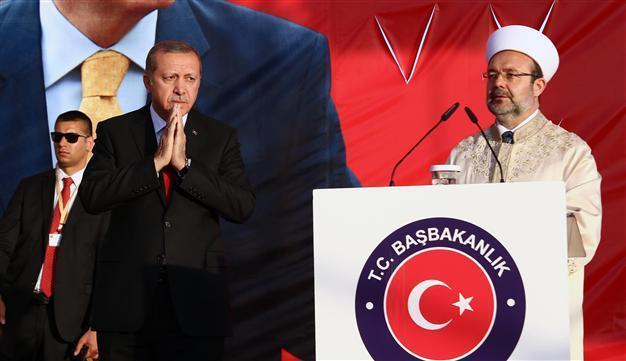Erdoğan defends luxury car and plane for top cleric, refers to the pope
ANKARA

DHA Photo
President Recep Tayyip Erdoğan has justified the controversial allocation of a luxury car to Turkey’s Directorate of Religious Affairs (Diyanet) head Mehmet Görmez, comparing the situation to the allocation of armored vehicles and private plane to the pope.
“Mehmet Görmez is not only Turkey’s religious leader. He is an esteemed religious leader of this region and the Islamic world. One should look at the issue from this angle,” Erdoğan said late on May 26, when asked about the allocation of the official car, which is estimated to have a value of 1 million Turkish Liras ($435,000).
Speaking in an interview on private broadcaster NTV, Erdoğan repeated his previously expressed opinion that he would have rejected Görmez’s returning of the car if he had been told beforehand.
The president also stated that it was his personal initiative that had allocated an armored Mercedes from the inventory of the presidential office to the Diyanet head.
“Why don’t they [critics] look at the Vatican? In the Vatican, the religious leader has a private plane, private vehicles, and armored vehicles,” Erdoğan said, expressing regret that Görmez had to fly in scheduled flights. He said he would speak with Prime Minister Ahmet Davutoğlu about providing an official private plane to Görmez for his visits abroad.
"The Vatican does not operate a special jet that is specifically earmarked for the Pope, but instead the Pope uses an Alitalia aircraft which is normally set aside from the passenger operations’ normal schedule," according to Vatican.com.
Early on May 27, main opposition Republican People’s Party (CHP) leader Kemal Kılıçdaroğlu responded to Erdoğan’s vow to provide a private plane for Görmez, saying “nobody should legitimize himself through the Diyanet.”
The Diyanet was created in 1924 to replace the Ottoman Sheikh al-Islam, the mufti with the authority to confirm new sultans and who also served as chief legal adviser. The caliphate itself was abolished in 1924, part of early modernizing efforts by Mustafa Kemal Atatürk, who founded the secular Republic of Turkey on the ruins of the Ottoman Empire.
Today, Görmez’s department drafts the weekly sermon delivered at the nation’s 85,000 mosques, which it supervises. It also employs all of Turkey’s imams, who are technically civil servants trained by the state.
